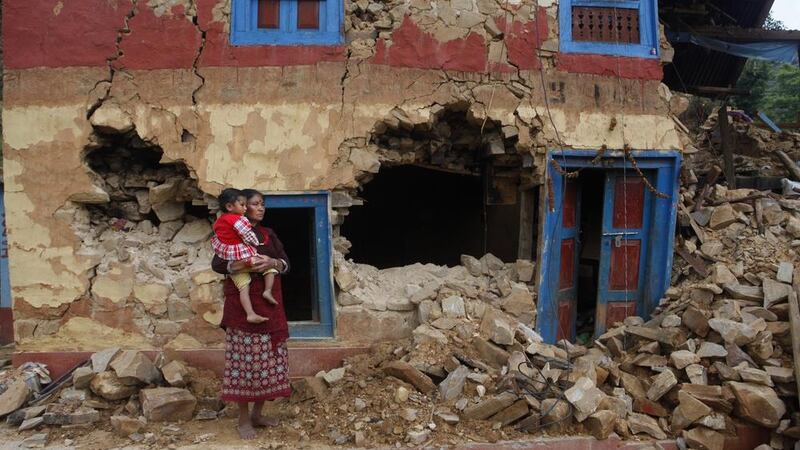IT WAS the quake that moved mountains killing 18 on Mount Everest and more than 8,500 in the valleys below but this week as Ros OSullivan updated the Concern team in Belfast on the Nepalese disaster, he arrived, remarkably, with reasons to be cheerful.
As the charitys long-serving senior humanitarian advisor O'Sullivan is hardwired to be positive, but after flying into the disaster zone two days after the earthquake struck on April 25 and surviving the major after-shock a fortnight later the Donegal native is proud to says that Irelands tremendous generosity is now helping devastated communities rise from the rubble.
Several schools have reopened while the first phase of Concerns relief effort is nearing completion, just a month after the 7.8-magnitude quake sent temples tumbling to the ground and a wall of ice hurtling into Everest Base Camp.
Nepal is a still a scene of devastation and there are areas which havent even been accessed yet due to poor roads and damaged infrastructure, O'Sullivan said, but I have been able to return home more content. Emergency relief has provided vital shelter and water to thousands of people in three of the most badly affected areas of Sindhuli, Sindhupalchowk and Dolokha.
That wouldnt have happened without the compassion and generosity of people in the north and the Republic who have rallied to the cause. There has been a tremendous response across the country and between Ireland and the UK 4 million has been raised in a relatively short period of time."
It has not been an easy three weeks for the Magheraroarty man who led the first wave of relief, distributing almost 14,000 emergency kits comprising reinforced plastic sheeting, blankets, sleeping mats, water containers and water purification tablets to survivors of Nepal's worst earthquake in 80 years.
But while in Kathmandu assessing the damage, the 52-year-old had to run to safety himself after a second quake measuring 7.3 magnitude rocked the city.
I have experienced earthquakes before, but the after-shock on May 12 was extremely powerful, he said. "There have been about 170 after-shocks in Nepal since, but thankfully none as catastrophic as the first.
You get to recognise the signs a low rumbling sound, like a train running under your feet, and a whoosh of wind, like when you go down an escalator in an underground. Thats the best way I can describe it. Then it will either settle down or some serious shaking will start.
It all happens very quickly and lasts only a few seconds or half a minute so you dont have time to think or get frightened. I always have a few butterflies in my stomach but then adrenalin and experience kick in.
O'Sullivan was in a hotel, setting up a Concern office, when the second quake hit and, along with his companions, made an instinctive dash for the door.
That is the first thing you do you find an open space. You also become used to sleeping in your clothes in case you need to flee a building in the middle of the night. And you always have your grab bag waiting by the door, a bag filled with essentials that you grab on your way out.
Once outside it was a case of contacting other team members by satellite phone the mobile network was down and then getting on with the task at hand alongside Concerns partner agencies, RRN (Relief and Rehabilitation Nepal) and Newah (Nepal Water and Health).
About 3,000 landslides have been reported in the area since the earthquake which has blocked access to some remote communities, making a difficult job even more challenging, O'Sullivan added, but the Nepali people are amazingly hardy and resilient.
When trekking in Nepal some years ago while overseeing a development programme, I witnessed a woman, at least 70 years old, walk for 11 hours with a 30-kilo load of agricultural produce on her back. The Nepali spirit is indomitable.
They are very spiritual, family-orientated people and eke out a meagre livelihood on the hillsides through subsistence farming, growing rice, potatoes and maize. And they are extremely grateful for all international help.
There have been questions raised over the Nepalese governments own response to the crisis which has left three million people from a population of 30 million without a home, but O'Sullivan is quick to highlight the commendable role of the army in the transportation of aid to remote, mountainous regions.
Physically, Nepal is one of the most beautiful places on Earth, he explained, but what attracts tourists to the country the mountains are now our biggest nightmare. I believe everyone was overwhelmed by the scale of the devastation, including the government, but that situation is now changing and the authorities are getting to grips with co-ordinating the relief effort as well as taking on a greater role in reconstruction.
He estimates the final reconstruction bill will be in the region of $10 billion and take many years to realise but patience and persistence have been his constant watchwords during 21 years at the forefront of natural and "man-made" emergencies across the world.
With experience drawn from crises in the Congo, Sudan and Somalia to the Philippines (where the Concern programme is now winding up two years after the 2013 typhoon), O'Sullivan knows such projects are more akin to a long-haul relationship than a brief holiday romance.
"You are in it for the long haul, literally," he said. "But I am a positive person by nature and what drives me is focusing on the end result and the knowledge that we can make and are making a massive difference."
Meanwhile, the second early recovery phase in Nepal will soon kick in, involving the distribution of cash to help farmers grow crops again, alongside a cash-for-work project in which healthy Nepali men and women will be paid to clear up the debris.
This phase is aimed at helping people regain livelihoods, O'Sullivan said, and it will also help restore pride. Along the valleys you can already see 'tell-tale' orange dots spring up, tarpaulins replacing brick and mud. But it is just the start.
The monsoons are coming and the priority now is to provide corrugated iron sheeting which will help people see out the worst of the weather.
Despite this, he leaves behind a country in better shape than when he first arrived, descending into Kathmandu airport surrounded by a ring of darkness.
That will be my abiding memory, he recalled. The electricity was out all over the city. There was a feeling of foreboding and I knew for that to happen in a country which had worked so hard to establish an electricity network, things must be very bad indeed."
O'Sullivan is in Co Leitrim now, spending time with his partner and baby daughter, but is in daily email contact with the 10-member Concern team in Nepal as he directs their programme from Ireland. He intends to fly out again in six weeks' time you get the feeling his 'grab bag' is on standby near the door.
:: To support Concern's work in Nepal, see concern.net.







